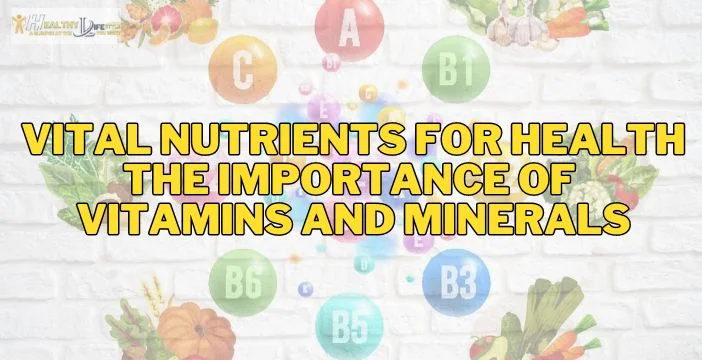 |
| Vital Nutrients for Health: The Importance of Vitamins and Minerals |
Vitamins and minerals, frequently alluded to as micronutrients, are key blends that your body anticipates in little amounts to ideally work. These little forces to be reckoned with assume a crucial part in maintaining up with your health and well-being . This article digs into the significance of vitamins and minerals and the role they play in promoting healthy lifestyle.
Vitamins: Nature's Nutritional Superstars
Vitamins are natural mixtures that are fundamental for different biochemical cycles in your body. They can be isolated into two classifications: fat-dissolvable and water-solvent.
Fat-Soluble Vitamins:
These vitamins (A, D, E, and K) are retained and put away in your muscle versus fat's tissues. They assume a fundamental part in keeping up with healthy skin, vision, healthy bone , and blood clothing. For instance, vitamin D is fundamental for calcium ingestion and healthy bone , while vitamin E goes about as a cancer prevention agent, shielding cells from harm.
Water-Soluble Vitamins:
These nutrients (B-complex vitamins and L-ascorbic acid) disintegrate in water and are not put away in that frame of mind for expanded periods. They assume basic parts in energy metabolism, immune system function, and overall vitality. For example, L-ascorbic acid is notable for its insusceptible helping properties, while B nutrients are fundamental for energy creation.
Minerals: Building Blocks of Health
Minerals are inorganic substances required for various physiological processes in your body.They can be sorted into two groups: major minerals and trace minerals.
Major Minerals:
These incorporate calcium, phosphorus, magnesium, sodium, potassium, and chloride. Significant minerals are required in bigger amounts and are fundamental for keeping up with bone health, regulating fluid balance, and supporting nerve and muscle capability. Calcium, for example, is pivotal for health bones and teeth.
Trace Minerals:
Trace minerals, such as iron, zinc, copper, selenium, and iodine, are needed in more modest but are no less important. Iron is vital for carrying oxygen in your blood, while zinc supports immune function and wound healing.
The Impact of Micronutrient Deficiency
A deficiency in essential vitamins and minerals can have a significantly impact on our health. For example:
Vitamin D Deficiency:
Can lead to weakened bones and a higher risk of fractures.
Iron Deficiency:
Results in anemia, causing fatigue and reduced cognitive function.
Vitamin C Deficiency:
Causes scurvy, with side effects like exhaustion,, muscle weakness, and bleeding gums.
Calcium Deficiency:
Can prompt osteoporosis and a higher gamble of fractures.
Meeting Your Nutritional Needs
To guarantee you meet your healthful necessities, , focus on a well-balanced diet that incorporates various food varieties. Here are a few tips:
Eat a Rainbow:
"Eat a rainbow for vibrant health. Fruits and vegetables of different colors provide a spectrum of vitamins and minerals crucial for overall well-being. Embrace the diversity of nature's palette to ensure your body receives a comprehensive array of essential nutrients."
Whole Foods:
select whole grains, lean proteins, and healthy fats in your diet.
Moderation:
Consume high-sugar and high-salt foods in moderation, as they can disrupt nutrient absorption.
Supplementation:
At times, you might have to take supplements, yet it's fundamental to talk with a medical services proficient to figure out what you really want.
Stay Hydrated:
Water supports physical processes and helps nutrient absorption, , while nutrients and minerals assume key parts in different physiological cycles, ensuring overall health.Together, they form a dynamic combination for maintaining optimal health and vitality.
Conclusion
Fundamentally, nutrition is the foundation of a healthy lifestyle and balanced diet is certainly not a prohibitive routine yet an economical and pleasant approach to feeding your body. By incorporating a variety of nutrient-dense foods and making mindful choices, you pave the way for optimal health.Remember, it's not just about the quantity of food but the quality of Embrace the excursion of feeding yourself, and your body will answer with improved vitality, resilience, and a foundation for a fulfilling and healthy life.
